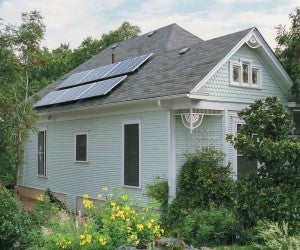 By: David Kolata, Citizens Utility Board executive director, and Dick Munson, EDF Midwest director, clean energy
By: David Kolata, Citizens Utility Board executive director, and Dick Munson, EDF Midwest director, clean energy
If Illinois wants a cheaper, cleaner, and more stable power grid, then we have to put policies in place that make it easier for people to adopt solar in their neighborhoods.
Fortunately, solar energy’s future looks a little brighter in Illinois since two recent Illinois Commerce Commission (ICC) rulings. The Citizens Utility Board (CUB) and Environmental Defense Fund (EDF) applaud the decisions after months of dogged work advocating the reforms.
On November 13, the ICC simplified solar interconnection standards, enabling Illinoisans to more easily connect their solar panels to the power grid. It’s now cheaper than ever to generate electricity using solar panels, and the costs keep coming down. But we need to cut administrative burdens to make it easier for people to enjoy cheaper, cleaner power – and the ICC’s decision is an important step in this direction.
The ICC’s second decision, on the same day, involved net metering. Home solar panels often produce more electricity than the home requires. Net metering is a benefit that allows solar panel owners to receive credits on their electric bills in exchange for sending excess renewable energy back to the power grid. To ensure that these net metering credits are accurate and fair in Illinois, the ICC’s second ruling requires the utility Commonwealth Edison (ComEd) to make public data from new digital smart meters that measure electricity usage.
[Tweet “2 ways #solar energy’s future in Illinois just got brighter”]
Plus, ComEd or any utility must offer an explanation if they reject specific proposals for virtual net metering. Virtual net metering allows entire neighborhoods to enjoy lower electric bills through solar – even homes that don’t have solar panels. That’s because customers can receive net metering credits for projects that are not on their property. For example, CUB and EDF support an Illinois community solar program through which neighborhood residents could invest in community solar projects (like at a business or church) and receive credits on their monthly electricity bills through virtual net metering. The ICC said that letting utilities disallow virtual net metering without explanation is “fundamentally unfair to customers” – a win for transparency as well as Illinoisans’ expanding solar options.
There’s more work to do: Each ICC decision is now due for legislative review at the General Assembly’s Joint Committee on Administrative Rules, a bipartisan legislative oversight committee. But, along with other consumer and environmental advocates, we believe the ICC’s moves are a good sign. Victories don’t always come easy, but these solar decisions are positive steps in Illinois’ quest to build a cleaner, more affordable, and more efficient power grid.









